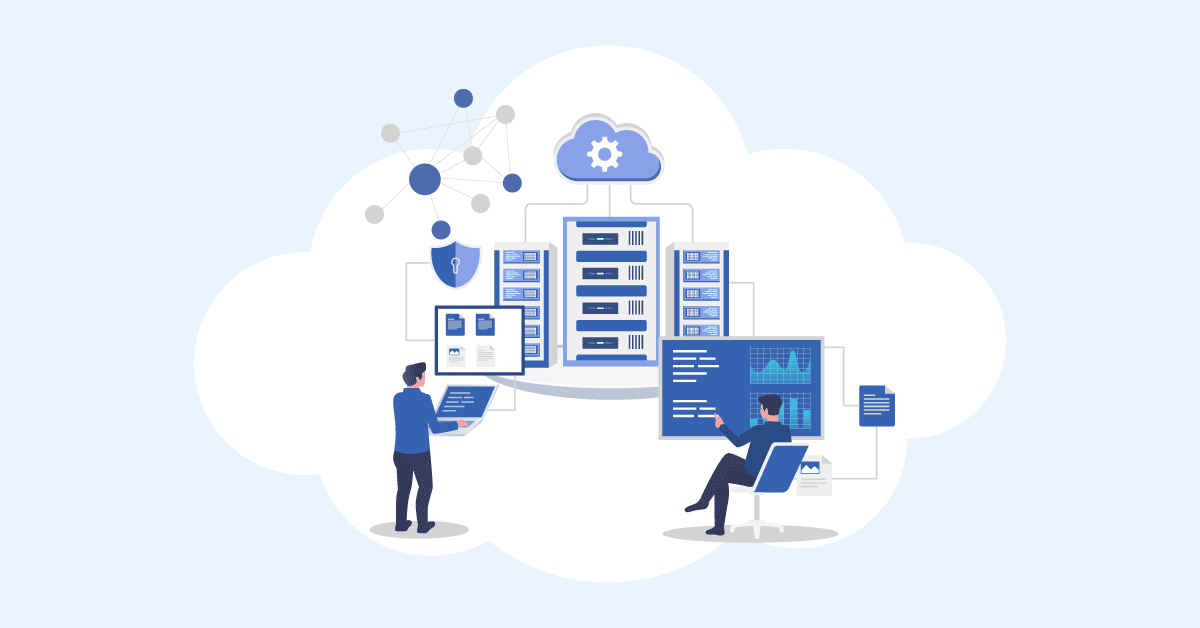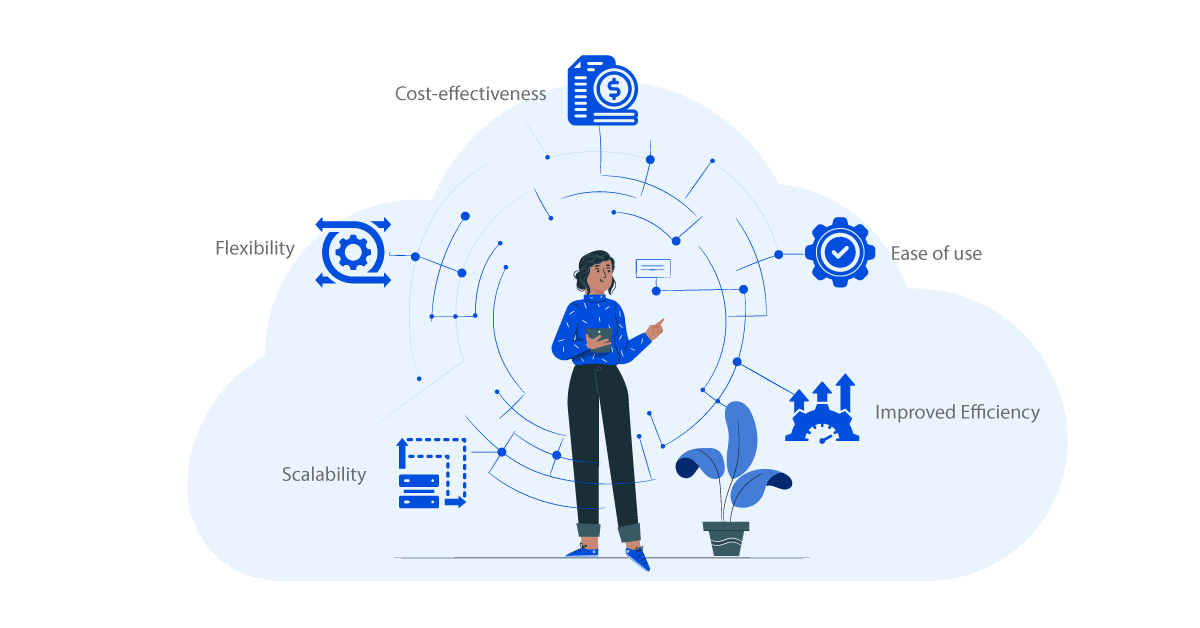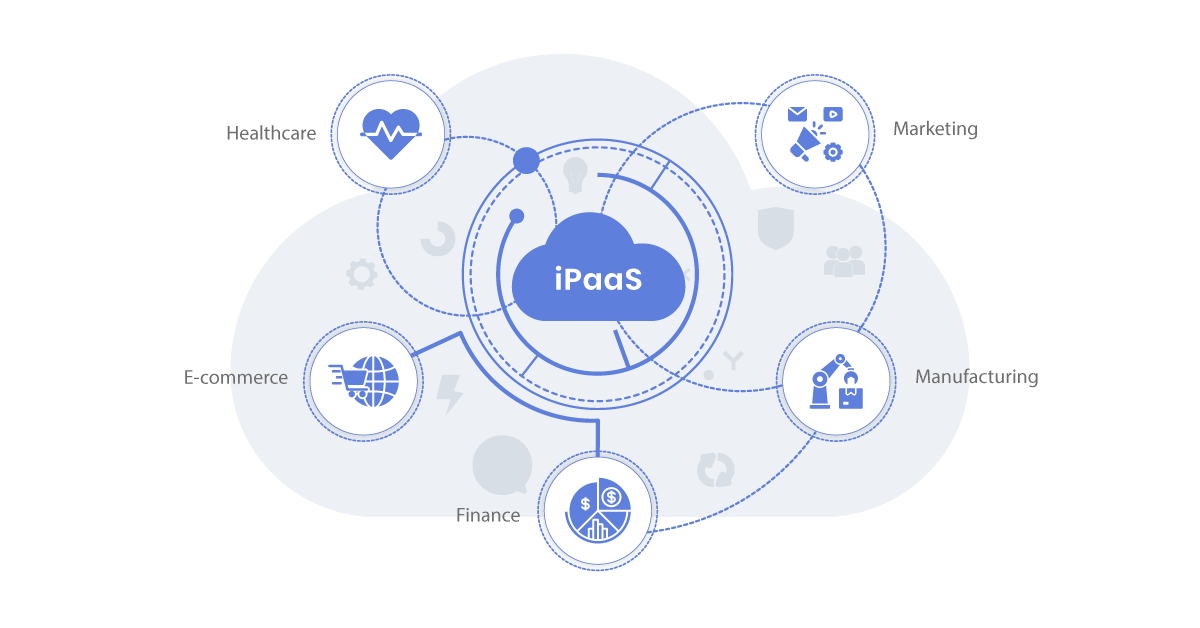Data is a critical asset for organizations. It provides valuable insights that organizations can use to make informed decisions and improve their operations. However, managing data can be challenging, particularly when dealing with significant amounts of data from different origins. This is where integration platform as a service (iPaaS) solutions come in. In this blog post, we’ll discuss how iPaaS solutions help organizations streamline their data integration and management processes.
Aonflow iPaaS – Free for First 3 Months!
Build and run up to 1,500 transactions monthly with no cost. No payment info needed!
How do iPaaS solutions work?
iPaaS solutions work by providing a platform for organizations to connect and manage their data sources. These sources could include on-premises systems, cloud-based systems, and external systems such as customer relationship management (CRM) and enterprise resource planning (ERP) systems. iPaaS solutions typically use connectors to enable data integration between these systems.
Benefits of iPaaS solutions
Here are some benefits of using iPaaS solutions for data integration and management:
Scalability
iPaaS solutions are scalable, meaning they can handle large volumes of data as an organization’s data needs grow. iPaaS solutions can also scale down when an organization’s data needs decrease, providing cost savings.
Flexibility
iPaaS solutions are flexible, allowing organizations to integrate data from various sources and in various formats. This means organizations can adapt their data integration and management processes to meet their evolving needs.
Cost-effectiveness
iPaaS solutions are cost-effective, as they eliminate the need for organizations to invest in hardware and software to manage their data integration and management processes. iPaaS solutions are typically subscription-based, allowing organizations to pay only for the services they need.
Ease of use
iPaaS solutions are easy to use, as they typically provide a user-friendly interface for managing data integration and management processes. This means organizations can focus on using their data rather than managing their data.
Improved efficiency
iPaaS solutions can improve the efficiency of an organization’s data integration and management processes. This means organizations can spend less time managing their data and more time using their data to drive business value.
Features of iPaaS Solutions
Here are some key features of iPaaS solutions for data integration and management:
Data mapping
iPaaS solutions provide data mapping capabilities, allowing organizations to map data from various sources to a common format. This means organizations can integrate data from various sources in a consistent manner.
Data transformation
iPaaS solutions provide data transformation capabilities, allowing organizations to transform data from one format to another. This means organizations can ensure data is in the correct format for the target system.
Data synchronization
iPaaS solutions provide data synchronization capabilities, allowing organizations to synchronize data in real time between various systems. This means organizations can ensure their data is up-to-date across all systems.
Data workflow automation
iPaaS solutions provide data workflow automation capabilities, allowing organizations to automate data integration and management processes. This means organizations can reduce manual intervention and improve efficiency.
Data quality management
iPaaS solutions provide data quality management capabilities, allowing organizations to manage the quality of their data. This means organizations can ensure their data is accurate, complete, and consistent.
API management
iPaaS solutions provide API management capabilities, allowing organizations to manage APIs that connect various systems. This means organizations can ensure API security and prevent unauthorized access.
Monitoring and reporting
iPaaS solutions provide monitoring and reporting capabilities, allowing organizations to monitor data integration and management processes and generate reports on system performance. This means organizations can identify areas for improvement and optimize their data integration and management processes.
Understanding Data Integration
Data integration is the process of combining data from different sources and presenting it in a unified view. In today’s business world, organizations generate vast amounts of data from multiple sources such as customer interactions, social media, sales, and operational systems. Data integration helps organizations manage and analyze this data to gain insights and drive business value.
How Does Data Integration Work?
Data integration involves a series of steps, including data mapping, data transformation, data synchronization, and data quality management. Data mapping involves identifying the sources of data and mapping them to a common data model. Data transformation involves converting the data into a format that can be easily integrated. Data synchronization involves ensuring that the data is up-to-date across all systems, and data quality management involves ensuring that the data is accurate, complete, and consistent.
There are several advantages to using iPaaS solutions for data integration:
Simplified integration
iPaaS solutions simplify the integration process by providing a range of pre-built connectors and APIs. This means that organizations do not have to spend time and resources building custom integrations between different systems. iPaaS solutions also provide data mapping and transformation capabilities, making it easier to integrate data from different sources.
Real-time data integration
iPaaS solutions enable real-time data integration, which means that data can be synchronized across different systems in near real-time. This ensures that organizations have access to up-to-date information and can make timely business decisions.
Reduced complexity
iPaaS solutions reduce the complexity of data integration by providing a unified platform for managing data integration and management processes. This means that organizations can manage all their data integration and management processes from a single platform, without having to deal with multiple tools and systems.
Improved data quality
iPaaS solutions provide data quality management capabilities, which means that organizations can ensure that their data is accurate, complete, and consistent. This is important for ensuring that business decisions are based on reliable data.
More savings
iPaaS solutions are typically more cost-effective than traditional data integration solutions. They eliminate the need for expensive hardware and software and reduce the need for IT staff to manage the integration process. This means that organizations can save money on IT infrastructure and staff costs, while still achieving their data integration and management goals.
Understanding Management Processes
Management processes are the series of activities that organizations undertake to achieve their strategic objectives. These processes can include planning, organizing, staffing, directing, and controlling. Effective management processes are essential for achieving business goals and ensuring that organizations can operate efficiently and effectively.
Aonflow is the leading integration platform.
You can kick-start by integrating your first-ever workflow in just a matter of minutes.
How iPaaS play a critical role in streamlining management processes
Here are some ways in which iPaaS can help:
Effortless Data Governance:
iPaaS solutions enable centralized data governance, offering a bird’s-eye view of data flows, transformations, and compliance measures. This simplifies data management by providing a comprehensive platform to monitor and enforce data quality, security, and privacy standards.
Example: A financial institution adhering to strict regulatory requirements utilizes iPaaS to monitor data movement across systems, ensuring that sensitive customer information is handled securely and in compliance with data protection laws.
Accelerated Onboarding:
For businesses acquiring new systems or partners, iPaaS expedites the onboarding process. It facilitates the rapid integration of diverse data sources, ensuring a swift transition and reducing the time required to realize the benefits of new systems.
Example: A retail chain acquires a new online marketplace to expand its reach. With iPaaS, they swiftly integrate the new platform with their existing inventory and order management systems, allowing them to tap into the new sales channel immediately.
API Management and Connectivity:
iPaaS not only facilitates data integration but also serves as a hub for API management. It empowers businesses to connect and manage APIs, enhancing communication and collaboration between various applications, services, and partners.
Example: An airline company leverages iPaaS to manage APIs that connect its booking system with travel agencies, hotel reservation platforms, and payment gateways. This streamlines the booking process, ensuring accurate availability and pricing information across partners.
Seamless Ecosystem Integration:
iPaaS solutions extend beyond internal processes and seamlessly integrate external partners, customers, and suppliers into the data exchange ecosystem. This harmonizes the flow of information across the entire value chain, from procurement to customer service.
Example: An automobile manufacturer uses iPaaS to integrate its supply chain partners, enabling real-time sharing of inventory levels, production schedules, and delivery timelines. This integration enhances collaboration and ensures timely production.
Data Enrichment and Transformation:
Incorporating data enrichment and transformation capabilities, iPaaS can cleanse, enrich, and refine data as it flows through the integration pipeline. This ensures that the data being utilized is of high quality, contributing to accurate insights and informed decision-making.
Example: A healthcare organization integrates patient data from various sources into a centralized system using iPaaS. As the data flows, iPaaS standardizes formats, corrects errors, and enriches it with relevant medical codes, ensuring accurate diagnoses and treatment decisions.
Event-Driven Automation:
iPaaS supports event-driven automation, triggering actions or workflows based on predefined events or triggers. This proactive approach minimizes latency in data updates, ensuring real-time information availability for critical processes.
Example: A logistics company uses iPaaS to automate inventory replenishment. When stock levels for a particular product dip below a threshold, iPaaS triggers an automatic order placement with suppliers, preventing stockouts and optimizing inventory management.
Comprehensive Reporting and Analytics:
With built-in reporting and analytics features, iPaaS solutions offer insights into data integration trends, performance metrics, and process efficiency. This information empowers organizations to optimize their integration strategies for maximum impact.
Example: A marketing agency integrates data from various advertising platforms using iPaaS. The solution provides comprehensive reports that consolidate campaign performance data, enabling the agency to analyze which channels deliver the highest ROI and make informed optimization decisions.
Suppose a small business wants to integrate data from various sources such as social media, email, and website analytics. With iPaaS, they can use a cloud-based solution that eliminates the need for expensive hardware and software. They can also reduce the need for IT staff to manage the integration process, as iPaaS solutions are typically designed for business users with little or no technical expertise. This reduces the overall cost of data integration, enabling small businesses to compete with larger enterprises on a level playing field.
Use Cases for iPaaS Solutions
Here are some use cases for iPaaS solutions:
E-commerce
E-commerce organizations can use iPaaS solutions to integrate data from various sources, such as sales channels, inventory management systems, and payment gateways. This means e-commerce organizations can ensure their data is up-to-date across all systems, improve order fulfillment, and provide better customer experiences.
Healthcare
Healthcare organizations can use iPaaS solutions to integrate data from various sources, such as electronic health records (EHRs), patient portals, and medical devices. This means healthcare organizations can ensure their data is accurate and complete, improve patient care, and comply with regulatory requirements.
Finance
Finance organizations can use iPaaS solutions to integrate data from various sources, such as banking systems, accounting systems, and payment gateways. This means finance organizations can ensure their data is accurate and up-to-date, improve financial reporting, and reduce manual intervention.
Manufacturing
Manufacturing organizations can use iPaaS solutions to integrate data from various sources, such as inventory management systems, supply chain management systems, and production equipment. This means manufacturing organizations can ensure their data is up-to-date across all systems, improve production efficiency, and reduce downtime.
Marketing
Marketing organizations can use iPaaS solutions to integrate data from various sources, such as customer data platforms, social media platforms, and email marketing systems. This means marketing organizations can ensure their data is accurate and complete, improve targeting and personalization, and measure campaign effectiveness.
Challenges of iPaaS Solutions
While iPaaS solutions offer many benefits, there are also some challenges that organizations should be aware of:
Security
iPaaS solutions involve the transfer of sensitive data between various systems, which can increase the risk of security breaches. Organizations should ensure their iPaaS solution provides adequate security measures, such as encryption and access controls.
Complexity
iPaaS solutions can be complex, especially when integrating data from various sources with different data formats. Organizations should ensure their iPaaS solution provides adequate data mapping and transformation capabilities to simplify the integration process.
Integration with legacy systems
Organizations may have legacy systems that are difficult to integrate with modern iPaaS solutions. Organizations should ensure their iPaaS solution provides adequate connectors and APIs to integrate with legacy systems.
Data governance
iPaaS solutions can make it difficult for organizations to maintain data governance, as data may be stored in various systems. Organizations should ensure their iPaaS solution provides adequate data quality management and monitoring capabilities to maintain data governance.
Final Thoughts
iPaaS solutions offer many benefits for organizations looking to streamline their data integration and management processes. iPaaS solutions provide a range of services, including data mapping, data transformation, data synchronization, data workflow automation, data quality management, and API management.
iPaaS solutions are scalable, flexible, cost-effective, easy to use, and can improve efficiency. Organizations can use iPaaS solutions for various use cases, including e-commerce, healthcare, finance, manufacturing, and marketing. However, organizations should also be aware of the challenges of iPaaS solutions, such as security, complexity, integration with legacy systems, and data governance. Overall, iPaaS solutions can help organizations unlock the full potential of their data and drive business value.
Aonflow iPaaS – Free for First 3 Months!
Build and run up to 1,500 transactions monthly with no cost. No payment info needed!


